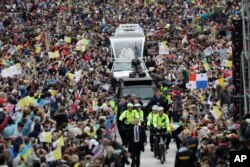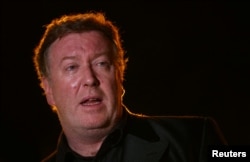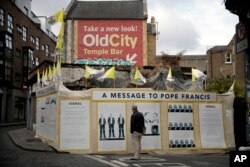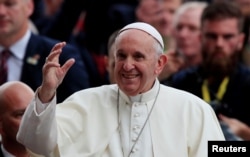Pope Francis has "begged for God's forgiveness" for the sexual abuse scandal that has rocked the Roman Catholic Church.
The pontiff said at a shrine in Knock, Ireland, on Sunday the scandal is an "open wound" and "firm and decisive" measures need to be taken to find "truth and justice."
Francis also rebuked the church in Ireland for how in decades past Catholic-run Irish institutions took the children of unwed mothers and put them up for adoption. He said the practice robbed the children of their innocence, leaving the children “abandoned” and “scarred by painful memories.”
Francis wrapped up his visit to Ireland Sunday with a huge outdoor Mass in Dublin's Phoenix Park, where the pontiff again asked for forgiveness when the church failed to offer compassion to “survivors of any kind of abuse.”
Hundreds of thousands of people braved rainy, windy weather to hear Francis, while thousands elsewhere in the city demonstrated against clerical abuse. Protesters in the town of Tuam recited the names of an estimated 800 babies and young children who died at a Catholic-run orphanage there, most during the 1950s.
Francis' call for forgiveness for the sexual abuse scandal came as a letter by Archbishop Carlo Maria Vigano was published in the National Catholic Register. In the 11-page letter, Vigano, the Vatican's retired ambassador to the United States, accuses Francis and other Vatican officials of ignoring sexual abuse claims against U.S. Cardinal Theodore McCarrick who was forced to resign last month after a church investigation found claims that he had abused a minor were credible.
Vigano says he told Francis in 2013 about claims that McCarrick bedded seminarians, but Francis lifted sanctions on McCarrick that Pope Benedict had imposed.
"He [Pope Francis] knew from at least June 23, 2013 that McCarrick was serial predator," Vigano wrote, adding "he knew that he was a corrupt man, he covered for him to the bitter end."
Meeting with abuse victims
On Saturday, Francis met for more than an hour with survivors of clerical abuse in Ireland and, by at least one account, uttered strong condemnation of members of the clergy who committed or covered up impropriety.
Paul Redmond, one of eight survivors who attended the meeting with the pope has told reporters that Francis called such clergy members “caca,” which translates to “human excrement.”
The pope met with eight survivors at the Papal Nuncio’s residence in Dublin. The Vatican has said it will not comment on what was discussed during the meeting, although the attendees are free to do so.
Pope Francis began the first papal visit to Ireland in almost 40 years by expressing the outrage he shares with the Catholic community over the “repugnant crimes” committed by priests who raped and molested children and the failure of church authorities to address them.
“I cannot fail to acknowledge the grave scandal caused in Ireland by the abuse of young people by members of the Church charged with responsibility for their protection and education,” Francis told a state reception at Dublin Castle where some abuse survivors were in attendance.
“The failure of ecclesiastical authorities — bishops, religious superiors, priests and others — to adequately address these repugnant crimes has rightly given rise to outrage and remains a source of pain and shame for the Catholic community.”
Vetting the church
In an effort to address the world’s outrage about the abuse scandal, Francis noted measures taken by his predecessor, Pope Benedict, to deal with the crisis. Benedict did not admit the Vatican’s culpability, though, in fostering a system of cover-up, and Francis gave no new plan for steps he would take to punish bishops who fail to protect their parishioners.
Francis did say he was committed to vetting the church of this “scourge” regardless of the moral cost or amount of suffering.
Ireland has changed greatly since Pope John Paul II visited in 1979, becoming much more secular following clerical sexual abuse scandals that began to surface in 2005.
Pope Francis’ visit comes at a time when recent sexual abuse crises in the United States, Chile and Australia have reminded the Irish people of similar scandals at the hands of Irish priests and bishops.
The pope recently wrote a letter to the world’s Catholics, stressing that “no effort must be spared to create a culture able to prevent such situations from happening, but also to prevent the possibility of their being covered up and perpetuated.”
Two U.S. cardinals — Cardinal Sean O’Malley, the pope’s top adviser on clerical sexual abuse, and Cardinal Donald Wuerl, the archbishop of Washington — were scheduled to attend the conference in Dublin but were absent because of further revelations of clerical sexual abuse in America.
Another U.S. cardinal, Theodore McCarrick, was recently forced to resign because of allegations of abuse and misconduct.
Sabina Castelfranco contributed to this report.









